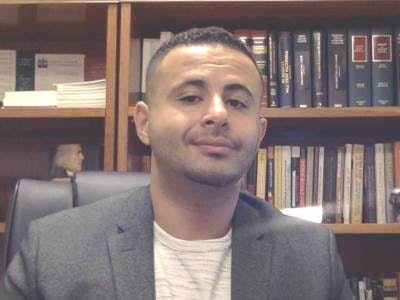 Khaled A. Beydoun, 37, advises new faculty members: “Find your own voice as a scholar and your own style as a professor.” (Photo courtesy of Khaled A. Beydoun)
Khaled A. Beydoun, 37, advises new faculty members: “Find your own voice as a scholar and your own style as a professor.” (Photo courtesy of Khaled A. Beydoun)When Khaled A. Beydoun entered law school at the University of California, Los Angeles (UCLA) back in 2001, two things led him to pursue a legal academic career — the chance to study under prominent critical race theorists and what he saw as the dearth of scholarship on racial Muslim identities in the aftermath of 9/11.
“It was transformative for me to see brilliant scholars of color talking about the law in ways that I had never heard before,” Beydoun recalls, referring to leading critical race theorists such as Kimberlé W. Crenshaw, Devon Carbado and Cheryl Harris, all professors of law at UCLA. “That really left an impression on me,” Beydoun says.
Beydoun’s law school entry also coincided with the heightened scrutiny that law enforcement directed toward Muslim Americans — or those perceived to be Muslims — in the wake of 9/11.
“I began to see a lot of gaps and opportunities in the legal scholarship,” Beydoun says. “A lot of the legal scholarship didn’t focus on the racial construction of Arab and Muslim Americans and the special legal crises faced by them after 9/11 but also before 9/11.
“That’s when I realized, ‘Hey, someone’s gotta write about this stuff. Maybe I should be the one.’”
Fourteen years later, Beydoun has established himself as a “vocal and visible” commentator on pressing legal issues that involve race and civil liberties, according to Leticia M. Diaz, dean at the Dwayne O. Andreas School of Law at Barry University, where Beydoun was named “Professor of the Year” for the 2014-15 academic year ― his inaugural year at the school.
“His student evaluations earned near perfect scores, evidencing that his passion for scholarship is matched by his love for teaching,” Diaz says.
Beydoun was raised by an Egyptian single mother on the West Side of Detroit in a mostly Arab and Black community. The racial and ethnic makeup of his childhood environs has since become the focal points of much of his work, which often draws parallels between the Black experience in America and Arab and Muslim experiences in the United States and abroad.
Consider, for instance, the article titled, “Why Ferguson Is Our Issue: A Letter to Muslim America,” which Beydoun penned for the Harvard Journal on Racial & Ethnic Justice in the aftermath of the 2014 police killing of Mike Brown, whose death became a symbol for police use of excessive force against Black men.
If Beydoun, a tenure-track assistant professor of law at Barry University, saw a gap in scholarship around issues of racial identities of Arabs and Muslim Americans following 9/11, much of his work has since served to close that gap in profound ways.
For instance, his article, “Between Muslim and White: The Legal Construction of Arab American Identity,” was recently cited in Hassan v. City of New York — a U.S. Court of Appeals for the Third Circuit decision that allowed litigation against the NYPD to proceed for its surveillance of Muslim communities.
“This illustrates both the scholarly and practical significance of his work,” Diaz says. “I see my scholarship adding to the legal literature but also having a broader social and political impact,” Beydoun says. “I want, ideally, to leverage my scholarship in a way to create broader public consciousness about who Muslim Americans are.”
As of late, Beydoun has been focusing on the impact of countering violent extremism (CVE) policing — an emergent national security policing model — on indigent and working-class Muslim American groups.
Based on recent developments — from suggestions of a Muslim registry to a proposed ban on Muslims from entering the United States — the need for such scholarship is perhaps more urgent than ever before.





















